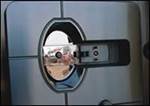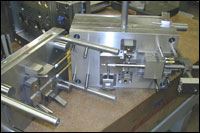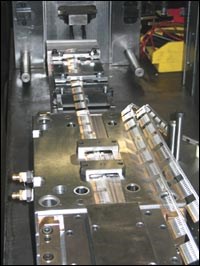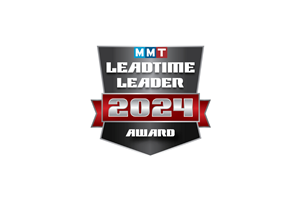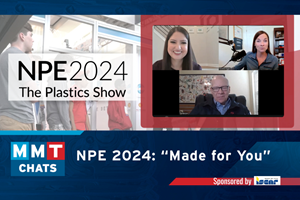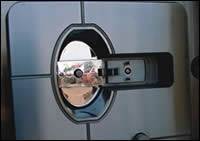Extreme Tool and Engineering: Growth and Optimism Keys to Survival
This moldmaker takes it to the extreme with dedication, determination and a drive to succeed in a global marketplace.
|
Nestled in rural northern Michigan's U.P., Extreme Tool and Engineering (Wakefield, MI) takes its name very seriously. In just seven short years, the company—what president Mike Zacharias calls a full-service plastic product development firm—has grown from six to 47 people. Primarily serving the automotive, consumer, computer, electronics and medical industries, Extreme Tool's mission is to "maintain a strong working relationship/partnership with a small but diversified customer base." Servicing this customer base requires dedicated employees who work "extremely" hard. "We work harder than any company I know of, and I don't try to minimize this during the interview process," Zacharias emphasizes. "Our customers expect special things, and we need special people who are willing to make things happen. We have true 24-hour-a-day design/engineering support in an effort to further reduce leadtimes. We also have degreed engineers setting up, programming and operating our high-end CNC equipment—pretty non-traditional efforts, but again, special people making special efforts nets special results." These extraordinary efforts have yielded some amazing results. The company grew 100 percent last year, a year in which many toolmakers struggled to survive, Zacharias notes. The company builds complex, intricate, high-volume production tools in four weeks (1,000-1,500 hour molds) and has gone global—exporting molds to Mexico, Asia, Hungary, Demark and Brazil. "We expect that future export business will comprise 25 to 30 percent of our business, and as a U.S. manufacturer, it sure is nice to be exporting versus importing," Zacharias notes.
What's In a NameIn July 1998, Extreme Tool and Engineering began when the assets of its former employer—Global Tool and Engineering—were purchased and Extreme Tool opened for business. "This in itself was a unique situation, as my staff and I had defined, purchased and installed all of that same equipment when Global opened," Zacharias recalls. "The early years were scary and going to a bank with nothing more than a crude business plan and a letter of intent to give us a ‘fair opportunity at their business' from three potential customers was really all we had." According to Zacharias, many have asked about the origin of the company's name. "Extreme means many things to us," he explains. "First, our location is extreme—far northern Michigan with average annual snowfall of more than 200 inches. The fact that we see more deer on the way to work than people/cars, and that bears and deer sleep 100 yards from our backyard could be considered extreme. Our dedicated local workforce and strong desire to make sure our company remains viable (and allow us to live here) prove to be factors that help motivate our employees to succeed. Our cost of doing business is lower here, partially due to Michigan State Renaissance Zone Tax Benefits (promotes business development in rural areas), and our employee turnover is much lower than most locations. We promote and advertise high quality jobs in a very safe, family-friendly, outdoorsman's paradise. We don't ask our employees to choose between lifestyle and career, rather, why not have both? Once our customers visit here, they usually wish to return. We work hard and play hard. Snowmobiling to dinner after a successful mold sample, an evening business meeting/strategy session while fishing in God's country, or a having a drink around a campfire after sitting in a tree stand for a couple of hours located 100 yards from our back door take the place of the more traditional golf outing. "Next is our business approach," Zacharias continues. "Our employees are the most dedicated in the world. There is no limit to how far our guys will go to meet a customer delivery or recover from a manufacturing mishap. Our leadtimes are generally noted to be the fastest available anywhere, and current on- time delivery rating is 97 percent plus. Finally, our solutions are customer-driven. We ask them what they need, not tell them what we will do. Most of our expansion activities have been customer-driven—including major capital expenditures that are specific to their needs. For example, we had a major electronics OEM approach us many years ago, and advise that we could do more of their developmental tooling work if we had a Class 100,000 molding room to tryout, validate and produce their initial samples in. Seventy-five days later, we had one. Recently, we had other major customers ask us to add additional value to the moldmaking process by fully validating their tooling before it leaves, rather than just completing a mechanical sample. They also asked us to build and validate their end of arm/automation tooling. One last requirement was that our equipment be compatible to what they had in their facilities—globally. Twenty-four hours after this request, we had all on order, and three weeks later we were trained and using it. "We seek relationship business, and are willing and able to invest time and resources as needed on a big picture/long-term relationship basis," he adds. "We take great pride in the level of service we provide, and seek and support relationships with the best molders and OEMs in the world."
Training and TechnologyParamount to Zacharias is keeping his employees highly motivated through a combination of training and investment in the newest technology. "We invest heavily in training and I am a firm believer in the payback on the same," he explains. "I don't believe in making equipment or software purchases without investing in/allowing the training required to use the same efficiently. Most often, the payback is a long-term issue versus immediate impact, but I believe the costs in not doing so would be insurmountable. Additionally, we offer our employees the opportunity to pursue any type of technical training or college course they wish to attend, and we pay all associated costs. The only requirements is that the training somehow applies to the business, that the employees put forth the effort needed to receive acceptable grades, and that it is coordinated in a manner that does not disrupt the normal flow of business any more than possible." On a more personal level, Zacharias stresses he has two core philosophies that usually seem to work well. "First, I lead by example," he states. "I do not ask anyone to do anything I have not done or will not do myself. I will not ask anyone to work harder than I have or do myself. And, I try to treat everyone fairly and compensate them for the value they add to the organization. Again, this does not mean that things are comfortable or easy, but I believe those days are over for U.S. moldmakers. There are too many people in this world who want what we have and are willing to work really hard to have it."
Managing GrowthOver the years, Extreme Tool has been challenged by managing growth from a cash, systems and personnel perspective, according to Zacharias. "We normally feel as though a first-time customer will become a customer for life, as long as our objectives and approach align with theirs," he emphasizes. "I am a toolmaker by trade, versus a businessman, and feel like the school of hard knocks is the only one I have ever gone to. This year, our focus has been to increase margins versus sales via more effective manufacturing processes and technology implementation. Managing cash during growth remains a major obstacle and short of winning a lottery or having a bank as a partner, I honestly don't know what the answer to that is. "Our business model is to be as self sufficient as possible, with very little outsourcing of any specific manufacturing activities," he adds. "The few select companies that we outsource to are as driven to meet leadtimes as we are, and those kinds of companies are not easy to find. They must understand that meeting our needs, expectations and delivery requirements is not a goal, it is a requirement. I find very few companies out there that understand the sense of urgency and delivery commitment as we see it. Our key vendors understand it and ask us how fast we need it versus telling us how fast they can deliver." Extreme Tool strives to continue to reduce leadtimes through strategic planning/early supplier involvement and technology/systems implementation. "Our customers understand our need to make a fair profit, reinvest in our business, and become strategic partners for the long haul," Zacharias explains. "I believe our four-week tools will need to be constructed in two to three weeks within three years. The good news in all of this is that cash flow will improve. Many moldmaking companies have implemented automation and other efficiency improvements; the challenge to us is to do so and remain agile, responsive and customer driven. Another goal is to add one major customer per year for the next three years, and to become their preferred vendor within a year." Zacharias operates Extreme Tool from a perspective of growth and optimism versus survival—with a focus on the future as well as the present. "In our location, we find a large number of very intelligent young people seeking career opportunities that are not interested in working in a metro area," he says. "This allows us to be very selective, and bring very high quality individuals on board in entry-level positions. These new/young employees may not help us tomorrow, but years down the road they will all play crucial roles in our success. We have a great blend of experience and youthful enthusiasm." Extreme Tool and Engineering is a young company gearing up for the long haul. "As long as our goal continues to be becoming one of the best plastic product development/moldmaking firms in the world and we continue to improve and reinvest in our people and equipment, our future will always be bright and there will always be need for what we do here," Zacharias notes. "Competing with the shop down the street is not the challenge we seek—competing with the best there is in the world is. The American Dream is not dead; it's just not as easy to see as it used to be. I feel we are up to this challenge, and more importantly, I have 46 other people working with me that agree." |
Related Content
Dynamic Tool Corp: Leadtime Leader Insights and Bold Plans for the Future | MMT Chats
MoldMaking Technology Editorial Director Christina Fuges gets the scoop from our 2024 Leadtime Leader Award Winner Dynamic Tool Corp., on the company's future, their trade show experience, finding new talent and the impact of this industry recognition.
Read MoreThe Critical Role of Management Representatives in ISO 9001
In ISO 9001 quality management systems, the Management Representative (MR) plays a crucial role. While the 2015 version of ISO 9001 no longer mandates this position, having a trusted management member serve as an MR remains vital for streamlining operations and maintaining quality standards.
Read MoreFAQs: What Are the Leadtime Leader Awards?
Here are answers to some frequently asked questions about MoldMaking Technology's annual Leadtime Leader Awards competition.
Read MoreMMT Chats: A More Modern NPE “Made for You”
The Plastics Industry Association is making NPE 2024 a “can’t miss”’ experience with more of everything – education, exhibitors and networking! The PLASTICS Industry Association Chief Operating Officer Glenn Anderson and Director of Trade Show Marketing Damaris Piraino share what’s in store for attendees of next year’s May 6-10, 2024 in Orlando, Florida.
Read MoreRead Next
ProLink Molds: Up and Running!
This brand-new moldmaker offers molds complete with the company’s own hot runner technology to better meet its customers’ needs.
Read MoreReasons to Use Fiber Lasers for Mold Cleaning
Fiber lasers offer a simplicity, speed, control and portability, minimizing mold cleaning risks.
Read MoreAre You a Moldmaker Considering 3D Printing? Consider the 3D Printing Workshop at NPE2024
Presentations will cover 3D printing for mold tooling, material innovation, product development, bridge production and full-scale, high-volume additive manufacturing.
Read More
